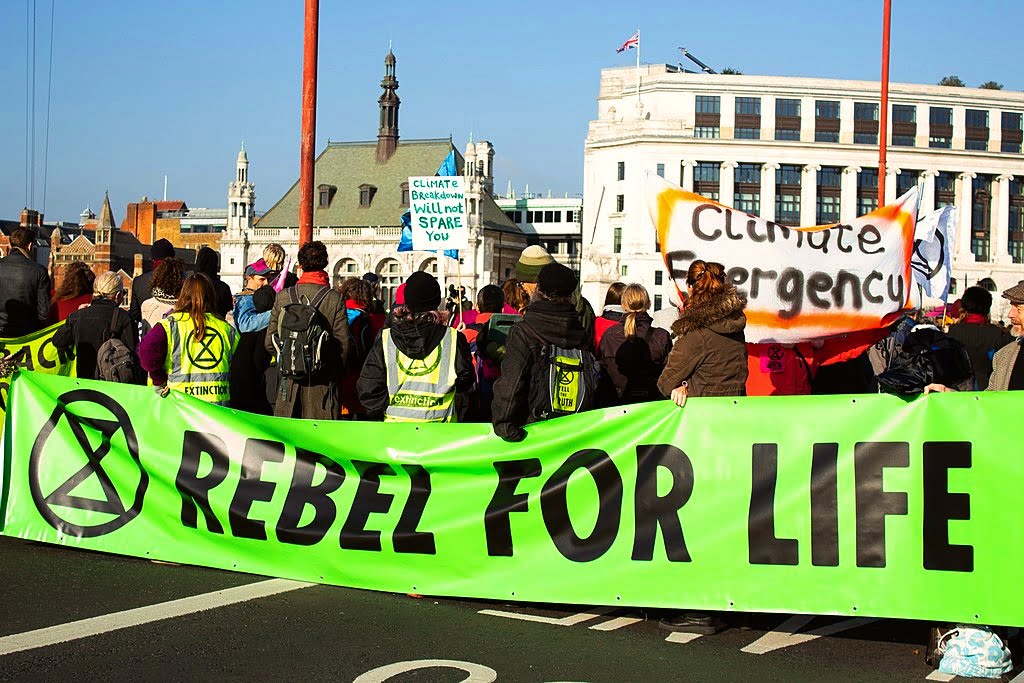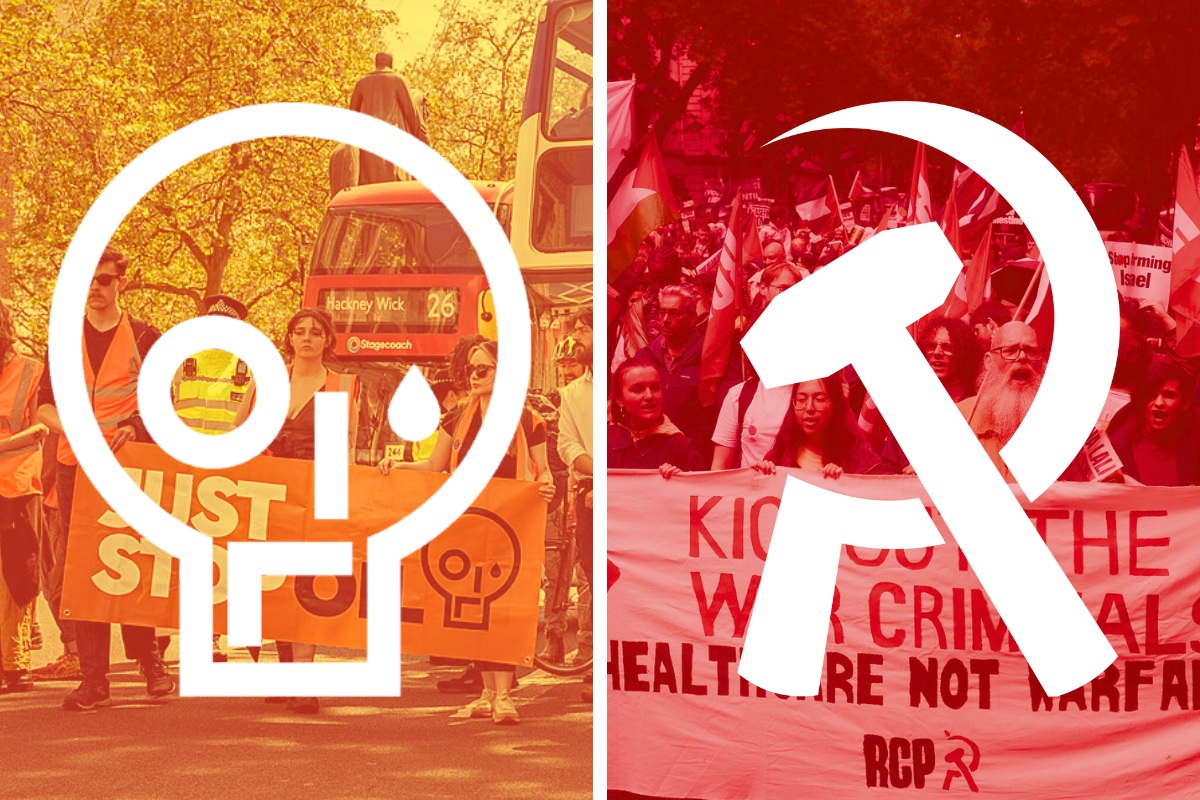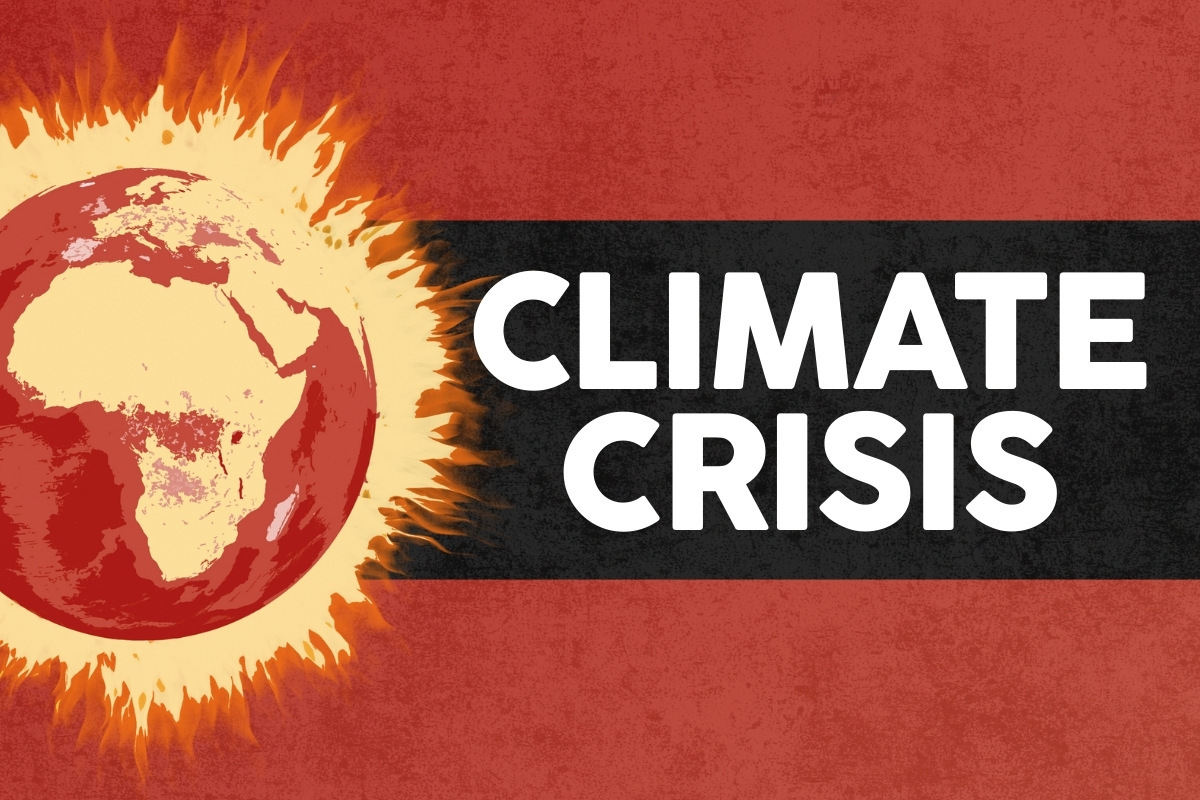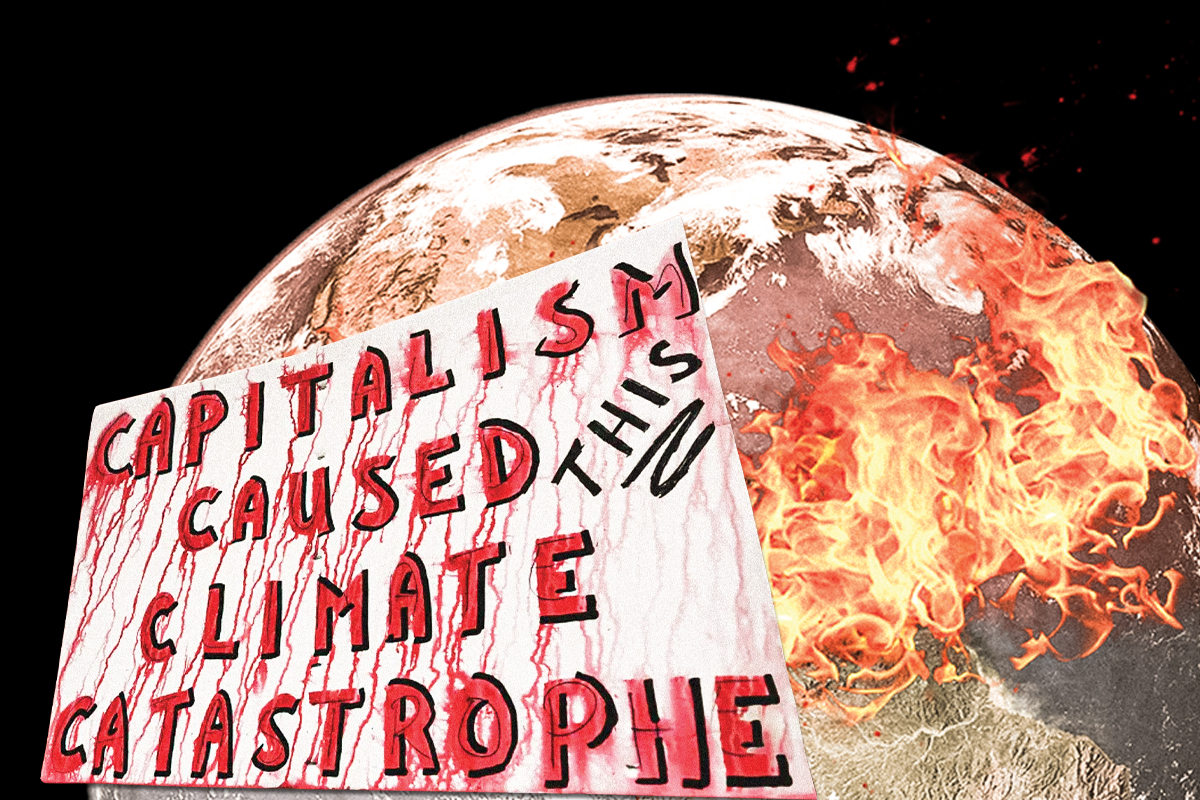The Extinction Rebellion movement has hit the headlines recently for its direct action tactics. But to fight climate change, we must unite the green and red agendas by linking ecological demands with those of workers.
Rampant wildfires across the world over the summer brought the pressing issue of climate change to the forefront of the news. But despite a generalised acceptance that the planet is plunging into disaster, very little is being done to stop it.
International treaties and laws that do exist don’t go anywhere near far enough. Even official reports from the IPCC (Intergovernmental Panel on Climate Change) suggest that current targets lag woefully behind what is necessary to avert serious and potentially irreversible effects. In any case, these pacts such as the Paris Agreement are completely toothless – as Trump has shown – and can easily be ignored or overruled.
Frustration
 As a result, it is understandable that many gravely concerned activists feel a growing sense of frustration and urgency on the issue of climate change, with an instinct and desire to act.
As a result, it is understandable that many gravely concerned activists feel a growing sense of frustration and urgency on the issue of climate change, with an instinct and desire to act.
It is in this context that the recent protest movement Extinction Rebellion (XR) was formed, with various leading environmental figures and academics launching a call to arms against those responsible for climate change: compliant and acquiescent governments who stand by whilst global corporations destroy the earth.
Since the movement’s initial declaration, various protests have taken place throughout the country and internationally. On 21st November, five bridges in London were occupied by protestors. In one day, over 80 activists were arrested. These protests were emulated throughout the UK, with follow up actions organised for the weekend after.
We spoke to one of the organisers of these protests at an action taking place in Parliament Square, who outlined why the Extinction Rebellion movement came into being:
“Exploitation in the world today happens not only against people but also the environment. How we treat the environment is how we treat ourselves. This rebellion is about recognising the emergency we’re in today. If we don’t act now, then people and the planet are going to suffer with dire consequences.”
This protest organiser was right to highlight that we are running out of time. Out of the hottest 10 years since the late 1800s, eight have occurred since 2008. This summer was one of the hottest and driest on record for the UK. The past four years, 2014, 2015, 2016 and 2017 have been the four hottest years since record keeping began. As one researcher has commented, “This is not a case of crying wolf. The wolves are now in sight.”
It is for these reasons of urgency that Extinction Rebellion uses non-violent direct action as a form of protest. Years of inaction from capitalist politicians show clearly that moral appeals to those in power are futile. This inertia and passivity at the top of society has forced this ‘rebellion’ from below against governments in Britain and elsewhere.
Direct action
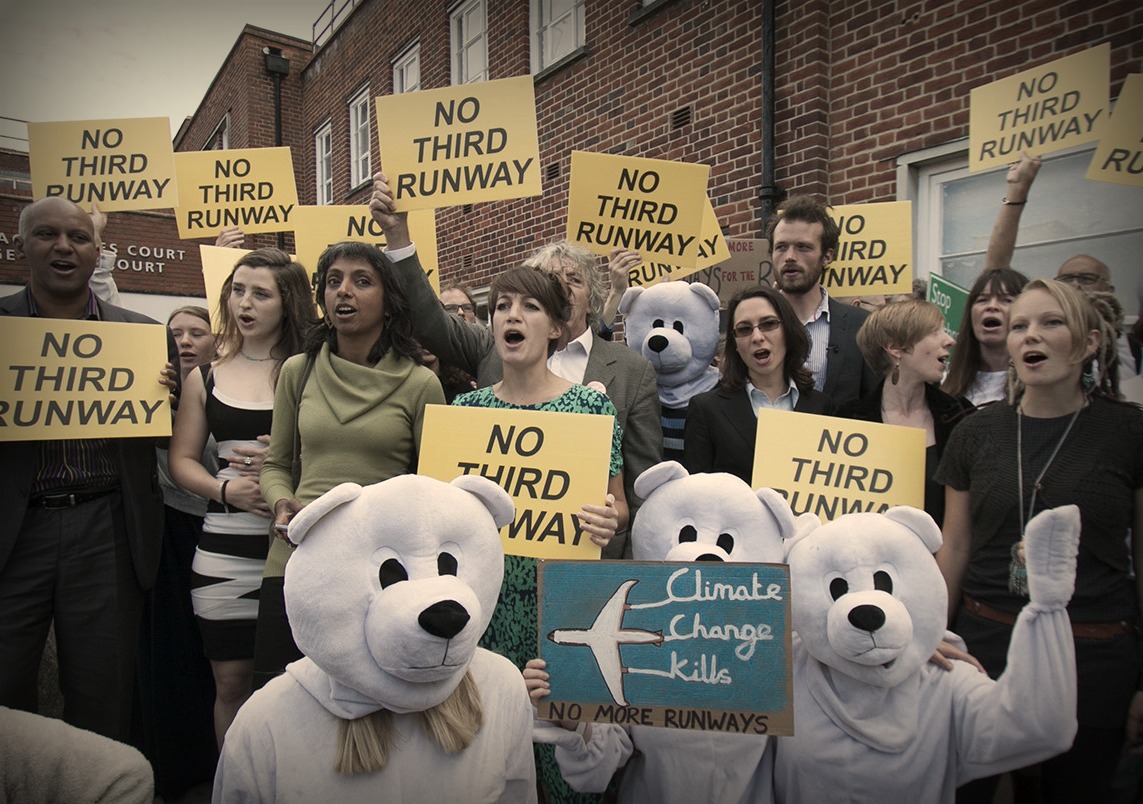 The climate movement, however, is not unfamiliar with these tactics. Similar protests in the past have seen environmental activists attempt to shut down airports and coal-fuelled power plants in an attempt to spark wider action against ecological destruction.
The climate movement, however, is not unfamiliar with these tactics. Similar protests in the past have seen environmental activists attempt to shut down airports and coal-fuelled power plants in an attempt to spark wider action against ecological destruction.
Buoyed by a passion and energy to change society, it is understandable why activists resort to such tactics in order to try and fight the system. However, the environmental groups behind the protests, including Extinction Rebellion, fail to clearly pinpoint the root cause of climate change: the capitalist system and its pursuit of profit. As a result, their actions fail to offer a real way forward.
One of the key tactics of XR, in this respect, is to force deliberate arrests. The group claim figures like Nelson Mandela and Martin Luther King as inspiration for their non-violent protests. At one recent protest, a speaker announced to the crowd: “So far we’ve had 100 people arrested in this movement. Let’s have a round of applause for them.”
In the eyes of some young activists, sacrificing themselves for the movement and for the planet must seem like a noble and worthy act. However, for the leaderships of these movements to present this as an effective tactic in the battle against climate change is dishonest and dangerous.
Marxists are not pacifists. We know that the interests of the exploited and the exploiters cannot be reconciled. So it is correct to expect and prepare for confrontation with the state and the ruling elite that it exists to protect.
Such battles, however, should not be fought simply by brave and courageous individuals, but rather by the organised working class. We don’t just need stunts – we need systematic political change. We desire direct action, but it must be mass direct action, involving the mass of workers and youth. And it must be aimed at raising political consciousness – linked to the idea of transforming society along socialist lines.
Those who engaged in non-violent protest in the civil rights movement did not seek arrest as a substitute for political action and organising. This is fundamental if we are to see genuine and lasting change.
In a promotional video, one of XR’s organisers claims they need 400 people to be arrested. This is what it encourages from its supporters. But in the eyes of the capitalist state, a few hundred arrests mean nothing.
Indeed, if we are serious in this cause (and we must be) then there is much more to be done than get arrested. We need to take control of whole factories, expropriating the capitalists and their industries in order to plan the economy for the benefit of the many not the few.
Nationalise the monopolies
 One recent protester held a sign that said “100 companies create 70% of global warming”. This highlights clearly why we need a class-based political solution to climate change: one that tackles the key question of ownership. After all, you cannot plan what you do not control; and you cannot control what you do not own.
One recent protester held a sign that said “100 companies create 70% of global warming”. This highlights clearly why we need a class-based political solution to climate change: one that tackles the key question of ownership. After all, you cannot plan what you do not control; and you cannot control what you do not own.
The big monopolies, driven by profit, are responsible for the lion’s share of greenhouse gas emissions. But nationalised under a socialist plan of production, they could employ modern green technologies to slash emissions in the space of years.
The capitalists have failed to invest in environmentally friendly alternatives because it cuts into their profits. Until we remove the profit motive from our system, we will never see viable solutions to the climate emergency.
And yet the solution is staring us in the face. Left-wing political and social movements are on the rise across the world. In Britain there is the possibility of seeing a radical left Labour government come to power in the coming months – one which has nationalisation of energy and transport as a key pillar of its economic programme.
If the militancy and radicalism of groups such as Extinction Rebellion was taken into the labour movement, then it could be used to equip the Labour Party with socialist environmental policies and give organised workers in the energy industry and other important sectors the confidence to fight for workers’ control and bold eco-socialist demands.
The power of the organised working class, armed with a socialist green agenda, would have a far greater impact than a million futile publicity stunts. After all, as Marxists have always stated, not a lightbulb shines and not a wheel turns without the permission of the working class.
In this sense, the most noble act we can do is to build with the labour movement and trade unions, and fight using the power of the organised working class for a genuine transformation of society that can finally put an end to climate change.
Instead of focussing on small-scale direct actions, therefore, environmental movements such as Extinction Rebellion must link up with the labour movement and fight for a socialist programme of nationalisation – under workers’ control – of the major monopolies. Only in this way can we ensure that they are run for the needs of society: economically and environmentally.
Climate change and class struggle: lessons from recent events
By Joe Russell
 As the UN’s annual climate summit begins (COP24), it is an appropriate time to look at the pressing issue of climate change.
As the UN’s annual climate summit begins (COP24), it is an appropriate time to look at the pressing issue of climate change.
This urgent question is even more relevant considering the current ‘yellow vests’ protests in France and the Extinction Rebellion movement in the UK. These two contrasting movements provide very important lessons about the way forward in the fight against climate change and in the class struggle – battles that are strongly linked.
Yellow vests
The yellow vests movement in France began as a spontaneous series of street demonstrations across France, in response to the Macron government’s proposed increase on fuel taxes. It has developed into a mass – almost insurrectionary – movement, with clashes between the police and protestors.
Meanwhile, the movement’s demands have developed politically in the course of the struggle: from simply opposing the tax-hike; to protesting against economic inequality and the rich elite; to now demanding the resignation of Macron and the end of his government.
The Macron government has attempted to dress up the tax hike as a ‘green-tax’. Yellow vest protestors, in turn, have been branded as Luddites, ignorant of the need to break with fossil fuels.
This is a ridiculous smear. The fuel tax increase was part of a range of measures designed to benefit the wealthy and increase the burden of austerity on the working class. It was never the real issue, but simply the final straw after years of falling living standards, austerity and attacks, and capitalist stagnation.
Protestors have made it abundantly clear that they are not against tackling climate change; they only ask that the real offenders – the polluting big businesses – are the ones made to pay, not ordinary workers.
The yellow vests movement is increasing in its militancy day-by-day, and the French government is now considering declaring a state of emergency.
Extinction Rebellion
 The Extinction Rebellion movement in the UK is of a very different character. Like the yellow vests, Extinction Rebellion was mostly organised online, beginning its life as an independent and very loose network. Unlike the yellow vests, however, it has never grown beyond small protests of negligible size, despite repeated publicity stunts. If anything, the movement is already losing momentum.
The Extinction Rebellion movement in the UK is of a very different character. Like the yellow vests, Extinction Rebellion was mostly organised online, beginning its life as an independent and very loose network. Unlike the yellow vests, however, it has never grown beyond small protests of negligible size, despite repeated publicity stunts. If anything, the movement is already losing momentum.
This difference can be put down to the political class content of the movements. The yellow vests movement involves thousands of workers and youth, brought together around demands that tackle important economic and social issues that unite the vast majority. This is why the movement has seen consistently high support in opinion polls, despite the endless slanders from the press and politicians.
In France and Britain alike there is clearly a deep frustration about rising costs of living, stagnant wages, precarious employment, and cuts to social services.
In Britain, this has found a political expression through the Labour Party in the form of the Corbyn movement, with mass rallies and grassroots organisation.
In France, this discontent has been manifested both politically through Melenchon’s France Insoumise movement, and also through protests on the streets: last year’s Nuit Debout mass assemblies; the rail strikes and university occupations earlier this year; and now the ‘gilets jaunes’ demonstrations against the neoliberal policies of Macron.
Red and green
 The contrast between the yellow vests and the Extinction Rebellion movements highlights the need for a programme that generalises the issues facing workers and youth. Instead of small direct actions over climate change, we need mass actions involving the participation and organisation of workers in struggle.
The contrast between the yellow vests and the Extinction Rebellion movements highlights the need for a programme that generalises the issues facing workers and youth. Instead of small direct actions over climate change, we need mass actions involving the participation and organisation of workers in struggle.
Climate Change may be an extremely pressing issue. But that does not mean it should be the only focus of our movement. Instead, it is the duty of all environmentalists to link up with the organised working class and the labour movement in order to fight for green demands as part of a wider socialist programme.
For those who recognise the limitations of capitalism, it is our duty to point out the complete impotence of capitalist international institutions and agreements, such as the UN and their climate summits. Only the socialist transformation of society can provide our planet with a sustainable future.

